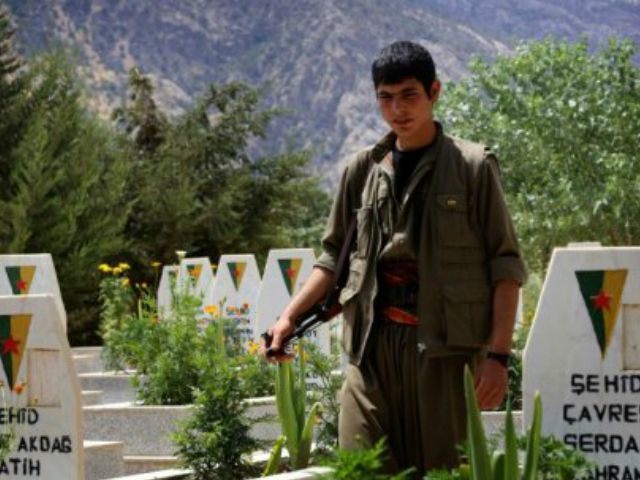The Turkish government’s anti-terrorism campaign, initially advertised as a campaign to destroy the Islamic State terrorist group, has killed hundreds of members of the Kurdistan Workers’ Party (PKK) and left the terror group significantly diminished, as its imprisoned leader calls for peace talks.
Kurdish news outlet Rudaw reports that these hundreds of deaths have occurred in Iraq, as Turkish airstrikes target PKK positions in the nation. These positions are sought out to fight ISIS, as the PKK has taken to protecting much of Yazidi northern Iraq from Islamic State raids.
Rudaw notes that an estimated 390 PKK fighters have died in Iraq, and more than 400 have been injured by airstrikes, according to the Turkish state Andalou news agency. Among those killed are allegedly the head of the women’s PKK militia, known as Gulten, and 30 of her female soldiers.
The Turkish attacks in Iraq have come as something of a surprise, as the government of President Recep Tayyip Erdogan had initially stated the campaign would only extend throughout a territory in Syria currently under ISIS-control. Both PKK leaders and Iraqi Prime Minister Haider al-Abadi have condemned the airstrikes, the latter calling the attacks a violation of his nation’s sovereignty. Masoud Barzani, the president of the Kurdish Regional Government of Iraq, has called for the PKK to fully withdraw from Iraq, as their presence puts his civilian population in the line of fire. Barzani has previously called the PKK “arrogant” and called for peace talks between Turkey and the PKK, blaming the latter for their dissolution.
Abdullah Ocalan, the imprisoned head of the PKK, is condemning a string of attacks on Turkish police by PKK terrorists and demanding the two sides negotiate a peace agreement. In a letter published from prison, Ocalan writes, “Our (PKK) fighters, leaders of the Peoples’ Democratic Party (HDP) and the Turkish government’s officials failed to administer and commit themselves to the peace negotiations,” demanding all parties “set a timeline” for peace, so that the fight against ISIS may resume uninterrupted.
The PKK is an official U.S.-designated terrorist group of Marx-Leninist leanings, though its supporters insist the PKK has largely abandoned this ideology and fight instead for a free, sovereign Kurdistan. Its members have staged a string of counter-attacks in Turkey, from the raid of a police department in southeastern Diyarbakır to a landmine attack that left four Turkish policemen dead on Monday. PKK fighters have even shot at Turkish military helicopters, with the latest attack leaving one Turkish soldier dead.
Cemil Bayik, the acting head of the PKK while Ocalan remains in prison, told the BBC last week that Turkey’s main preoccupation in a campaign alleged to combat the Islamic State is to destroy the PKK. “They are doing it to limit the PKK’s fight against IS. Turkey is protecting IS,” he said, adding, “Erdogan is behind IS massacres. His aim is to stop the Kurdish advance against them, thus advancing his aim of Turkishness in Turkey.”
The United States has sent a fleet of F-16 Falcon Air Force jets to Turkey’s Incirlik airbase, with the intent of flying them over Syria and targeting ISIS positions. The United States has cooperated with Kurdish forces in Syria in the past– mostly the People’s Protection Units (YPG and YPJ)– and Kurds are hopeful these airstrikes will help them. As the New York Times notes, however, many fear that Turkish influence will turn American power against them. Turkey has demanding the YPG stay out of the “ISIS-free zone” the campaign is meant to create, which Kurds protest is unfair to the most successful anti-ISIS army on the ground in the Middle East.
“There is only one group that has consistently and effectively battled ISIS in Syria, and that is the Y.P.G.,” Redur Khalil, a YPG spokesman, told the Times. “Opening another front in the region — as Turkey has by attacking the P.K.K. — will make the forces fighting ISIS weaker, which in turn makes ISIS stronger.”

COMMENTS
Please let us know if you're having issues with commenting.